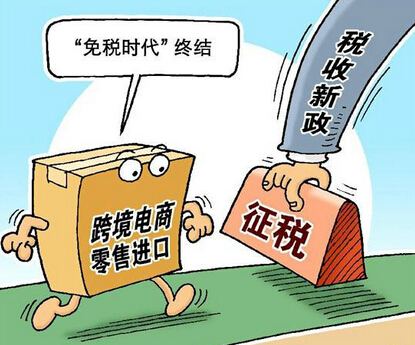The new tax on imported goods purchased from e-commerce sites will not affect Chinese travelers who buy abroad, the Ministry of Finance said on last Saturday.
财政部上周六表示,电商零售进口商品税收新政将不会影响出境购物的中国游客。
Shoppers had expressed concern that a new tax on foreign products, which went into effect on last Friday, would spell trouble for outbound tourists. However, the ministry said the fears stemmed from confusion.
消费者表达了对上周五正式生效的进口商品新税制的担心,他们认为该新税制将为出境游客带来麻烦。不过财政部称,这些担忧源自对政策的理解不到位。
"The new policy targets e-commerce, not individual outbound tourists," People's Daily quoted an unidentified ministry official as saying.
《人民日报》援引财政部不具名官员的话称:“新税制只是针对电商,而非出境个人游客。”

According to the authority, the rules for tourists returning from abroad remain unchanged, with purchases up to the value of RMB5,000 exempt from duties. The new tax relates only to e-commerce platforms that allow consumers to order imported goods online to be delivered through postal services.
据该官员介绍,回国时个人游客携带在境外购买的进境物品免税额5000元并没有变化。新税制仅影响那些允许消费者网购通过邮递方式进境的进口商品的电商平台。
The policy is aimed at creating a "level playing field" for cross-border e-commerce sites and brick-and-mortar stores that sell imported goods. It means overseas retail goods bought online are no longer treated as personal postal articles but as imported goods.
这一政策的目的是为那些跨国电商网站及销售进口产品的实体店铺创造一个“公平竞争的环境”。这也意味着在网上购买的海外零售商品将不再被当作个人邮递物品,而是进口货物。
Cross-border e-commerce has boomed with the surge in demand for higher-quality products among China's middle class. For a time, websites have enjoyed an edge over other channels, such as onshore duty-free shops, as they did not need to pay tariffs, import value-added tax or consumption tax.
跨境电商的蓬勃发展很大程度上得益于中国中产阶级对高质量产品需求的激增。一段时间以来,网站相比其他购买渠道,比如实体免税店享有优势,因为在网站购买商品不需要支付关税,进口增值税或消费税。













